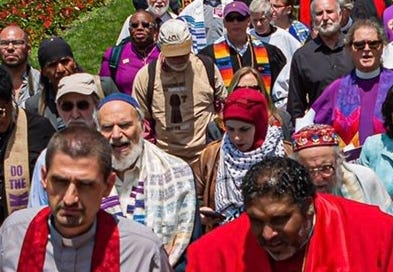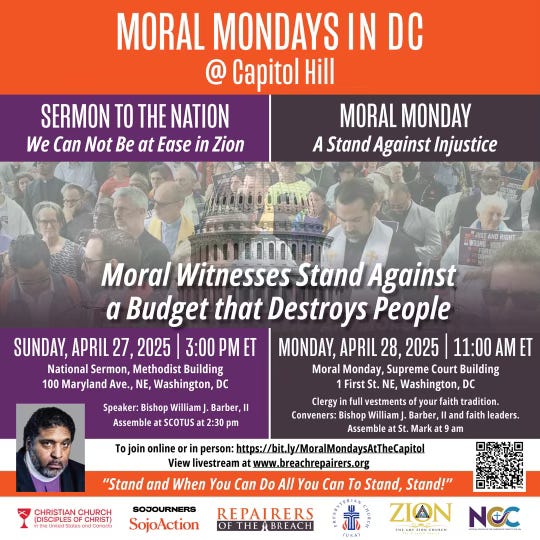For Christian preachers, Holy Saturday is a strange day. We preach the “Seven Last Words” of Jesus on Good Friday. We get up early on Sunday to proclaim the good news of God’s resurrection power. But our pulpits don’t offer many opportunities for a Holy Saturday message.
In the traditional affirmation of faith that is a regular confession of Christian liturgies, we sum up the story of Saturday in a single line:
…he [Jesus] descended into hell…
But the church hasn’t developed many traditions around Jesus’ ministry in hell. Check your local listings: churches don’t hold services between Good Friday and the midnight Easter Vigil or early Sunday morning sunrise service.
As public theologians, our work is often to take the liturgy of the church to the streets—to make “good news to the poor” a Word of hope for our neighbors and “let justice roll down like waters” an invocation in public life. But if God in human flesh went to hell on Holy Saturday to liberate the souls who languished there, then maybe this day is an invitation to ask what our story offers beyond the community of faith that will gather tomorrow to proclaim Jesus as our Lord.
Gandhi, who was not a Christian, said he learned the power of truth-force to confront and transform evil in public life from the witness of Jesus. He summed up the message like this:
Living Christ means a living cross; without it life is a living death.
Gandhi faced the brutality of British colonial rule, both in South Africa and in India. He understood at a gut level how the cross was designed by an autocratic regime as a torture device to inspire fear and compel the masses to comply. In Gandhi’s own experience, the cross was the officer’s club, the soldier’s gun, the jail cell where he could be locked away. But Gandhi observed how Jesus transformed the cross through the power of nonviolence. By building power through a moral movement and refusing to turn away, even taking up the cross in love, Jesus exposed the myths that propped up the autocrats of his day.
Though the Roman regime looked like it had the ultimate authority, it actually couldn’t force people to bend to its will.
It couldn’t even force Jesus to hate the people the regime used to torture and kill him: “Father, forgive them,” Jesus prayed from the cross, “for they know not what they do.”
This is the wisdom of the “living cross” that Gandhi understood—the truth-force that the Rev. James Lawson, and Dr. Martin Luther King, Jr., Rosa Parks, Fannie Lou Hamer, Rev. James Reeb, Abraham Joshua Heschel, and so many moral leaders of the 20th century showed us during America’s Second Reconstruction. Jim Crow was propped up by a thousand myths that told people why white and Black folks couldn’t share life together. Everyone had personal experiences that told them these myths weren’t true, but the lynching tree and Bull Conner’s dogs were the crosses that threatened lethal violence against anyone who dared not comply. These instruments of brutality were always on display, threatening anyone who dared to challenge the myths.
The Southern freedom movement chose to take up the cross in public. They descended into the hells of Parchman Prison and the Winona Jail. When they did, their moral movement exposed the lie of every myth that propped up the injustice of a segregated society.
The Scriptures exhort us to “set the captives free.” If we are unwilling to challenge the hellish realities we face with moral dissent, the we enable and capitulate to the lies that hold our nation captive. Hell, we know, is isolation. When we deny people access to healthcare and leave them to try to survive on their own, we condemn them to a kind of hell. When low-wage workers lives are cut short in the richest nation in the history of the world because we will not pay them what they deserve, we damn them to a hell on earth. Jesus descended into hell to deliver us from our past, redeem our present, and make a way for a new future. America needs moral agents to descend into the hells we have created and stand up for truth, love, and justice, refusing to be afraid.
Beginning on Ash Wednesday of this year, clergy and moral leaders stood on the steps of the US Supreme Court to insist that we must meet the brutality of the present regime with the nonviolent power of a moral movement. Opposition to abuses and extreme policies that will impact nearly everyone in this nation is inevitable; but autocratic regimes want violent and angry opposition that allows them to justify tanks in the street and protestors in jail.
A living cross, on the other hand, can expose the lies of the Trump regime.
It can make clear to everyone—even those who thought this regime might serve their interests—that an immoral philosophy is driving the direction of policy choices.
It is the responsibility of a moral movement in this moment to expose these myths:
1. The deliberate attempt to use executive orders as way to intentionally violate the constitution, thereby creating enough confusion to distract the people from what is really going on in Congress that has the weight of law.
2. The tyranny of technology and the dehumanization of people.
3. The attempt to make people justify their existence, which has roots in racism apartheid, and fascism.
4. The denial of equality on every front.
5. The outright violation of freedom of speech, due process in the law, equal protection under law for all persons, and birthright citizenship.
6. The outright betrayal of liberty.
7. The idolatry of the certainty that underlies white supremacy.
8. The misuse of religion in Christian nationalism as an attempt to falsely claim that their immoral actions are moral and just.
You don’t have to be Christian—or even particularly religious—to feel that we have descended into a hell of our own in America, where people can be snatched from their homes by representatives of our government and disappeared to a gulag in El Salvador without any recourse. Like the lynching trees of the South and the crosses of ancient Rome, these public acts of brutality are designed to inspire fear that compels the masses to comply.
But we cannot comply. We must transform today’s instruments of brutality into powerful tools that can expose the lies through the power of truth-force. This is the power of moral opposition. It is the work of Holy Saturday—and every day.
Clergy and moral leaders have committed to come together at the Capitol to pray for our nation in the face of this crisis and to demand that our leaders act to prevent proposals that destroy people and lives. All people of good will are invited to join.
Learn more and register to join us Sunday, April 27, for a Sermon to the Nation from the Capitol and Monday, April 28, for Moral Monday at the Capitol.






Gratitude to all clergy and moral leaders who can stand with Bishop Barber and all. I will be with you in spirit and good energy to swell the power of a moral opposition.
Everyone in America should read this...very powerful.